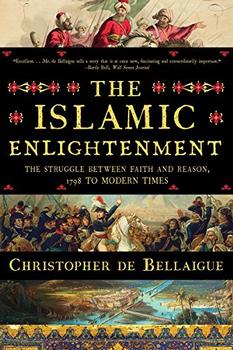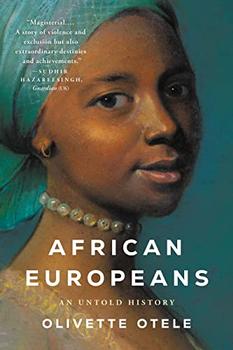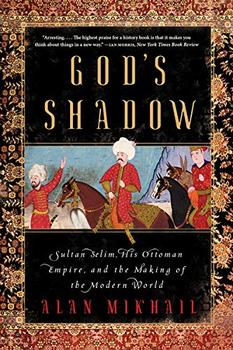Summary | Excerpt | Reviews | Beyond the book | Read-Alikes | Genres & Themes | Author Bio

The Struggle Between Faith and Reason, 1798 to Modern Times
by Christopher de BellaigueA revelatory and game-changing narrative that rewrites everything we thought we knew about the modern history of the Islamic world.
With majestic prose, Christopher de Bellaigue presents an absorbing account of the political and social reformations that transformed the lands of Islam in the nineteenth and early twentieth centuries. Flying in the face of everything we thought we knew, The Islamic Enlightenment becomes an astonishing and revelatory history that offers a game-changing assessment of the Middle East since the Napoleonic Wars.
Beginning his account in 1798, de Bellaigue demonstrates how Middle Eastern heartlands have long welcomed modern ideals and practices, including the adoption of modern medicine, the emergence of women from seclusion, and the development of democracy. With trenchant political and historical insight, de Bellaigue further shows how the violence of an infinitesimally small minority is in fact the tragic blowback from these modernizing processes.
Structuring his groundbreaking history around Istanbul, Cairo, and Tehran, the three main loci of Islamic culture, de Bellaigue directly challenges ossified perceptions of a supposedly benighted Muslim world through the forgotten, and inspiring, stories of philosophers, anti-clerics, journalists, and feminists who opened up their societies to political and intellectual emancipation. His sweeping and vivid account includes remarkable men and women from across the Muslim world, including Ibrahim Sinasi, who brought newspapers to Istanbul; Mirza Saleh Shirzi, whose Persian memoirs describe how the Turkish harems were finally shuttered; and Qurrat al-Ayn, an Iranian noble woman, who defied her husband to become a charismatic prophet.
What makes The Islamic Enlightenment particularly germane is that non-Muslim pundits in the post-9/11 era have repeatedly called for Islam to subject itself to the transformations that the West has already achieved since the Enlightenment?the absurd implication being that if Muslims do not stop reading or following the tenets of the Qur'an and other holy books, they will never emerge from a benighted state of backwardness. The Islamic Enlightenment, with its revolutionary argument, completely refutes this view and, in the process, reveals the folly of Westerners demanding modernity from those whose lives are already drenched in it.
In this comprehensive and well-researched history, de Bellaigue examines the evolution of Islamic thought and Mideast politics over almost two centuries, viewed through the eyes of some of its most revolutionary thinkers. This remarkably vivid account has something for Islamic scholars and lay readers alike. It is accessible, not requiring a wealth of prior knowledge, and detailed, populated by many lesser-known historical personages. Those seeking to understand the hornet's nest of Middle Eastern politics, conceived from the union of Islamic dogma and Imperialist meddling, could certainly opt to start here...continued
Full Review
(620 words)
This review is available to non-members for a limited time. For full access,
become a member today.
(Reviewed by Lisa Butts).
The Turkish author and activist Halide Edib (also sometimes spelled as Edip) Adivar is one of the influential women highlighted by de Bellaigue in The Islamic Enlightenment, for her literary talent as well as her ardent nationalist allegiance. She published two memoirs and 19 novels, and was an outspoken voice of support for women's rights and Turkish independence.
 Edib was born in Istanbul in 1882 and educated at Istanbul's American Girls College at a time when most girls did not attend school. After graduating, she married a mathematics professor from the school, and had two sons with him before they divorced in 1910. She worked as a journalist and published her first two novels in 1909-1910. In 1911 she traveled to London, where ...
Edib was born in Istanbul in 1882 and educated at Istanbul's American Girls College at a time when most girls did not attend school. After graduating, she married a mathematics professor from the school, and had two sons with him before they divorced in 1910. She worked as a journalist and published her first two novels in 1909-1910. In 1911 she traveled to London, where ...
This "beyond the book" feature is available to non-members for a limited time. Join today for full access.

If you liked The Islamic Enlightenment, try these:

by Olivette Otele
Published 2023
A dazzling history of Africans in Europe, revealing their unacknowledged role in shaping the continent.

by Alan Mikhail
Published 2021
An explosive global history that redefines the historical origins of the modern world through the life of Sultan Selim I and his Ottoman Empire.